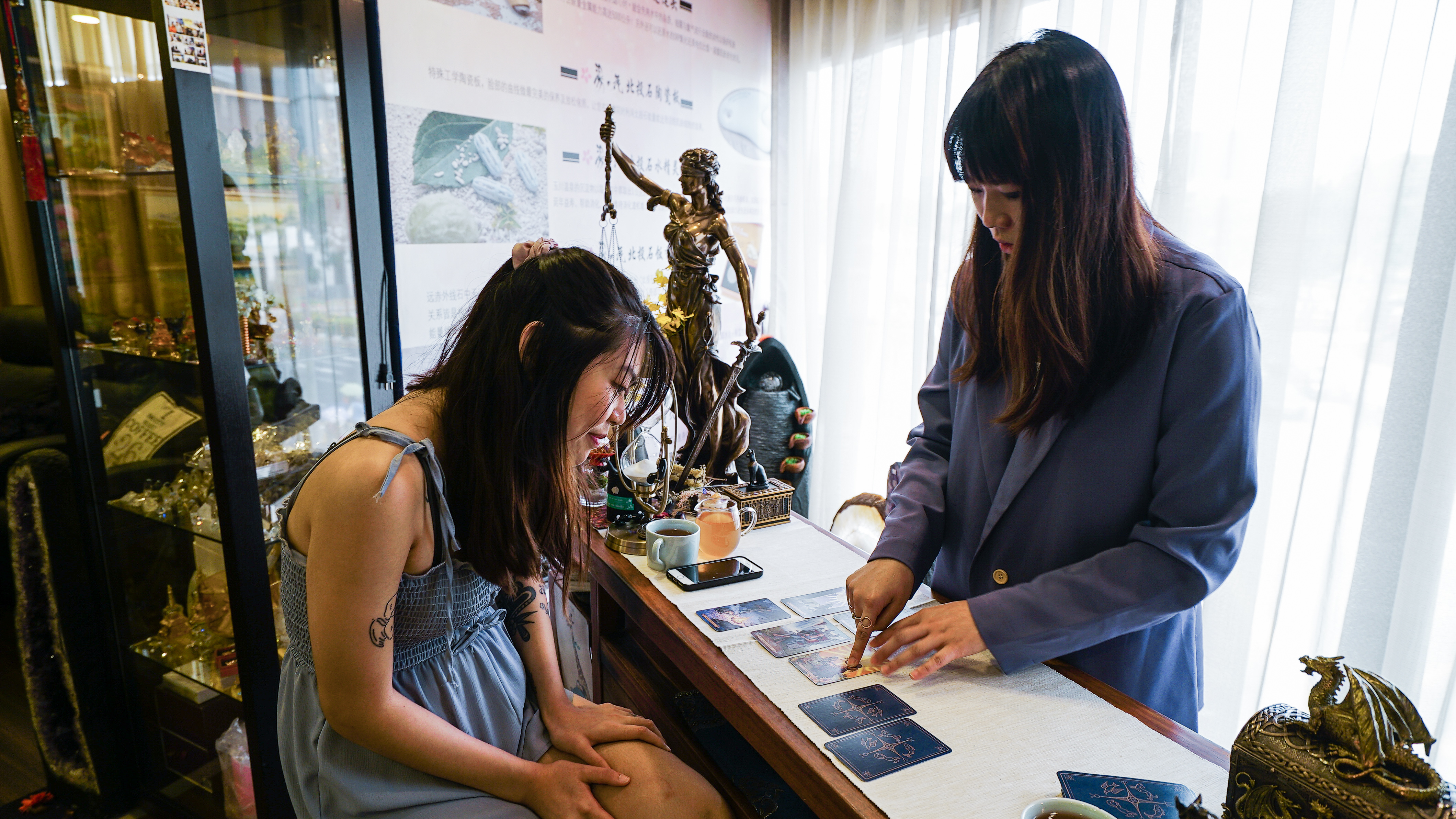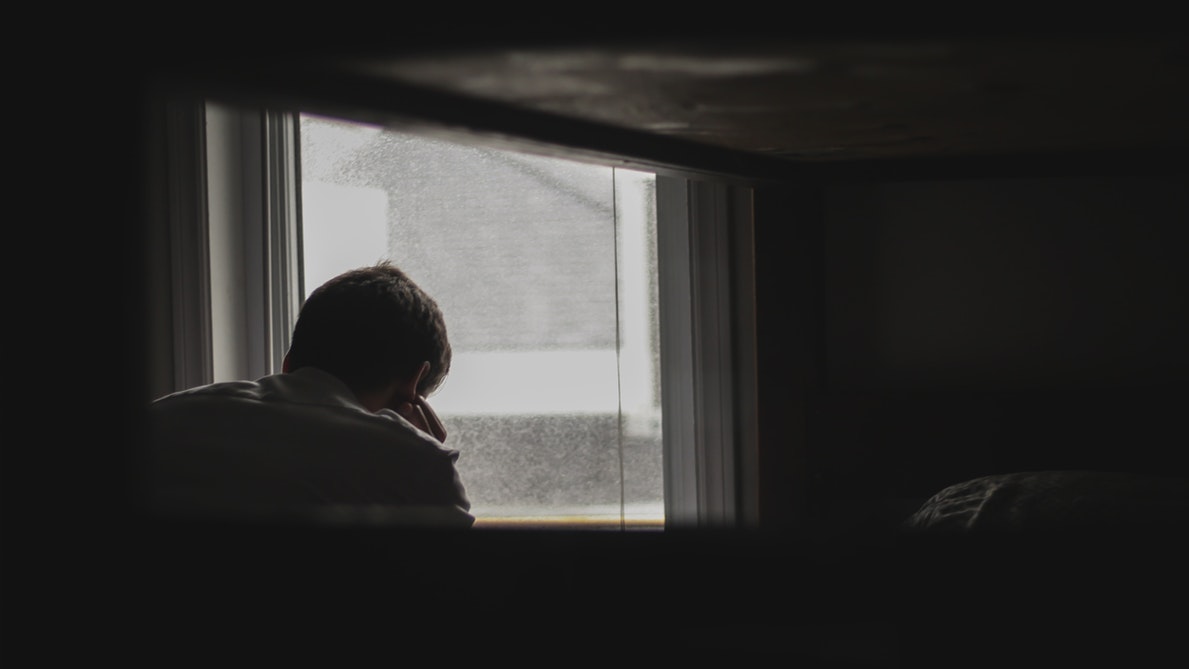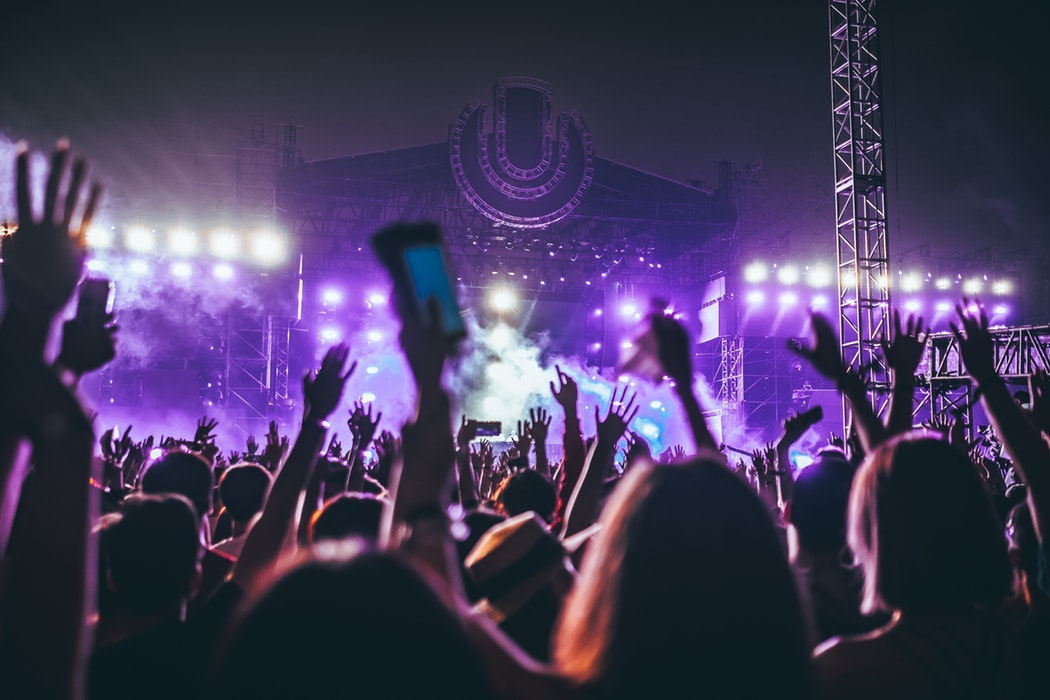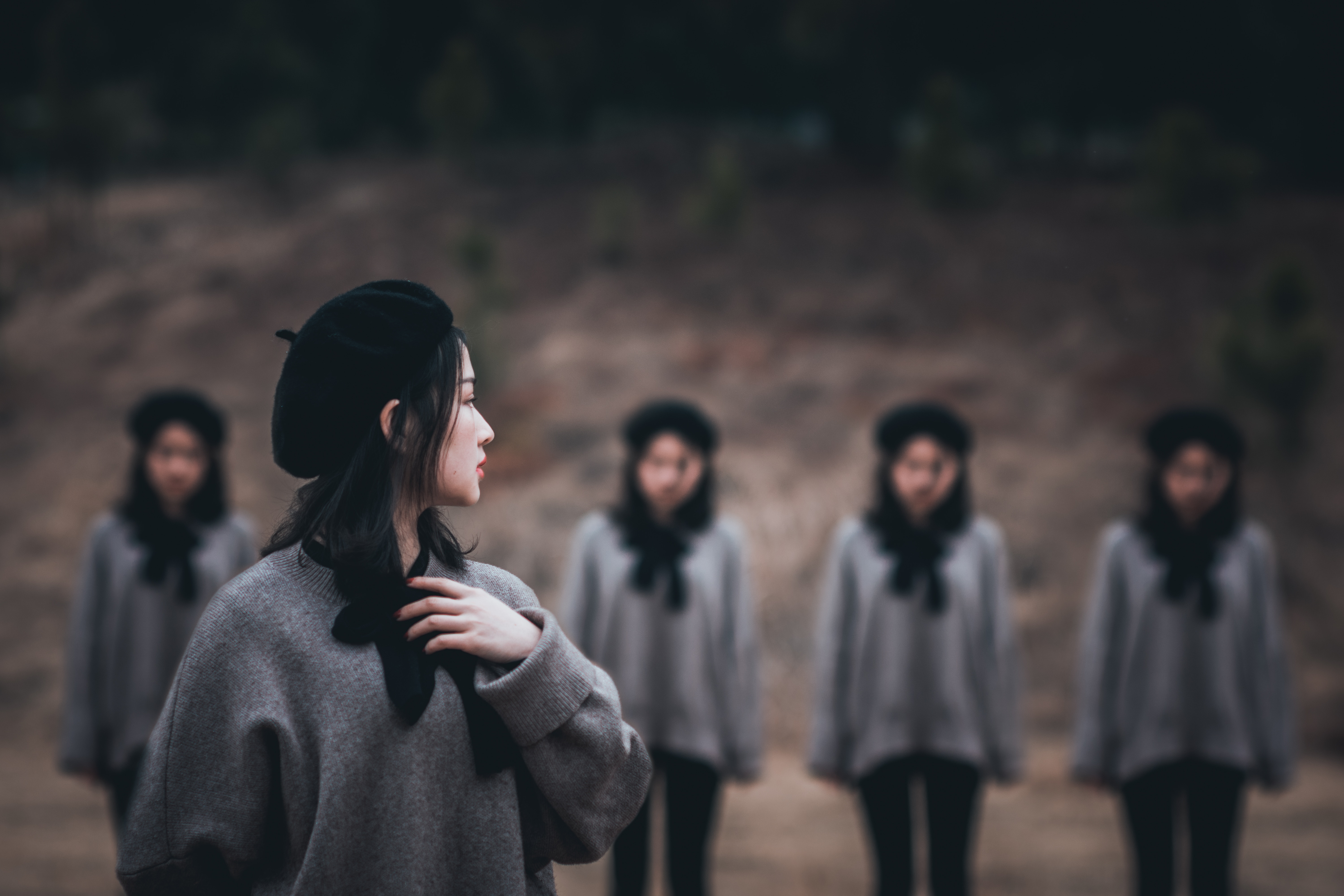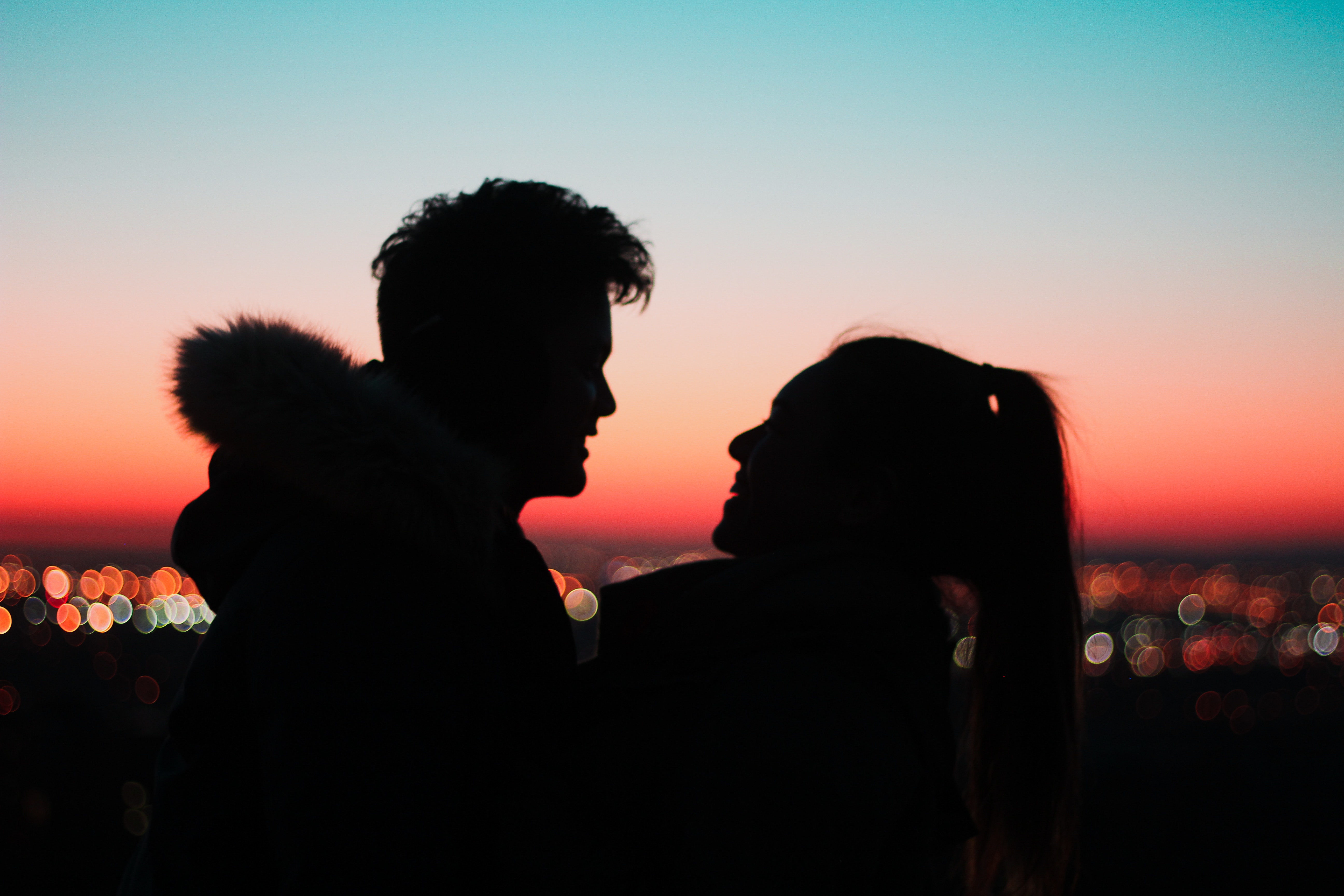For the longest time, people have been paying thousands of dollars on 'healing stones' and special talismans that promise to bless the owners with better health and dispel negative energy.
"Scam", "gimmick", and "manipulative" are just some of the terms that come to mind when one thinks of anything spiritual, and that includes tarot card readings, fortune telling, and the sorts. But do they really deserve to be dubbed as such? And if they are, why do people still buy into things like these?
In search of answers, I found myself at the second floor of Fu Lu Shou Complex, where I decided to get an aura reading done at Kang Li Mineral Kingdom.
“I think people need these kind of spiritual [readings] to really let certain things go and help themselves and ourselves also.”
The 32-year-old spiritual practitioner, Yi Xin, explained when I asked her why people are still going for spiritual readings amidst my reading.
She has been working at Kang Li Mineral Kingdom for over 16 years now.
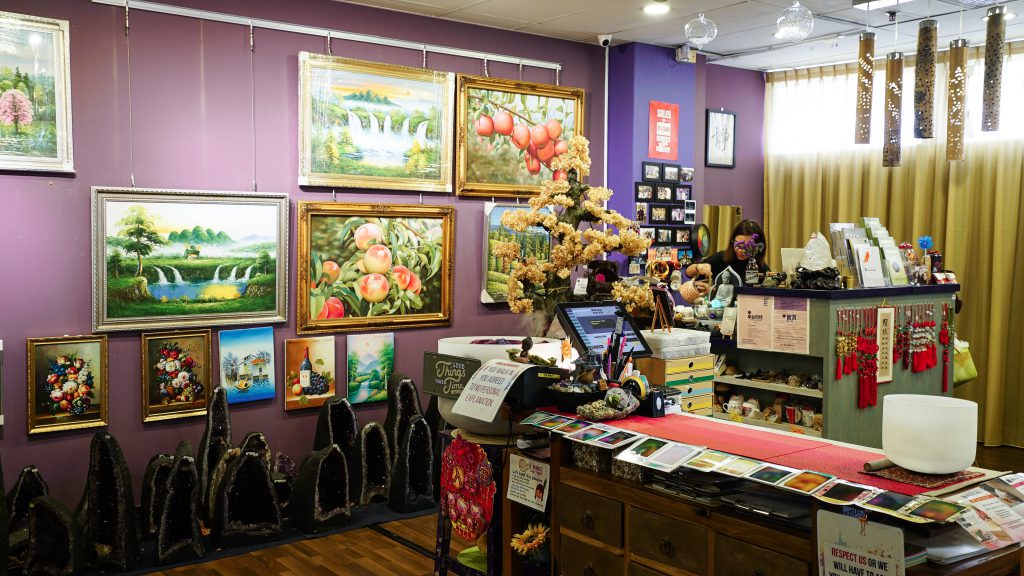
Maybe it’s the warm smile staff wore or the soothing background music, but as I stepped foot into the shop, I felt welcomed and strangely at ease.
Unlike what I had envisioned, the shop isn’t rundown and cramped with sculptures and scriptures. Canvases of scenic oil paintings decorated the walls while gemstones and agate crystals lined two rows beneath them. A counter smack in the middle of the shop is lined with polaroid-like prints of aura photography, with labels such as “goddess aura” and “rainbow aura”.
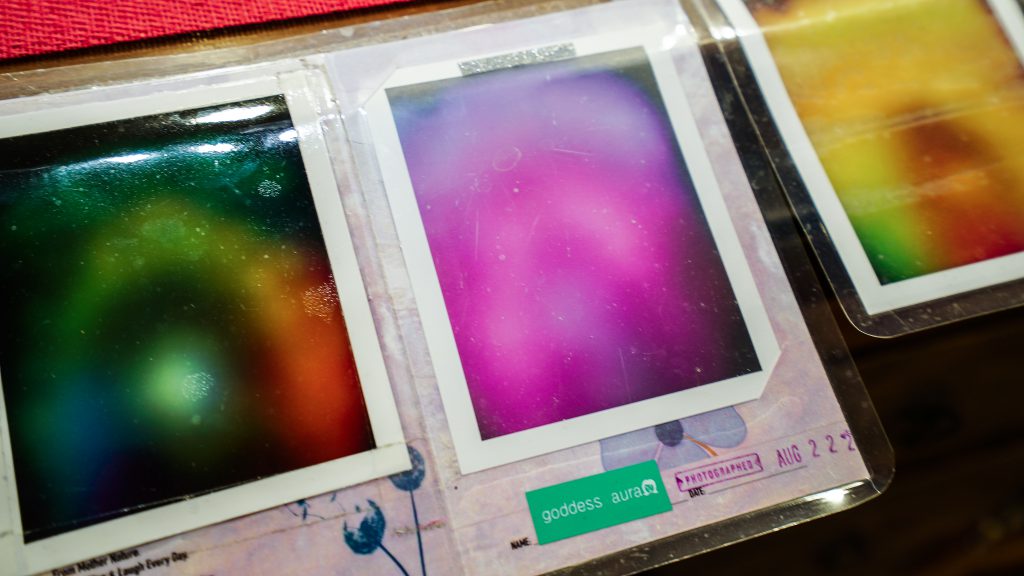
After savouring the cup of berry tea they served, one of the staff ushered me to another spot to get my aura photographed.
Getting My Aura Photographed
With a nervous smile, I made my way to a wooden bench positioned right in front of a black backdrop. A vintage looking film camera propped by a tripod sits a metre before me.
The staff told me to relax and place my hands on the two metal hand prints thats by my left and right, although my mind was racing with questions, “What in the world is going on? What does this do? How does this work?”, I kept mum and did as told.
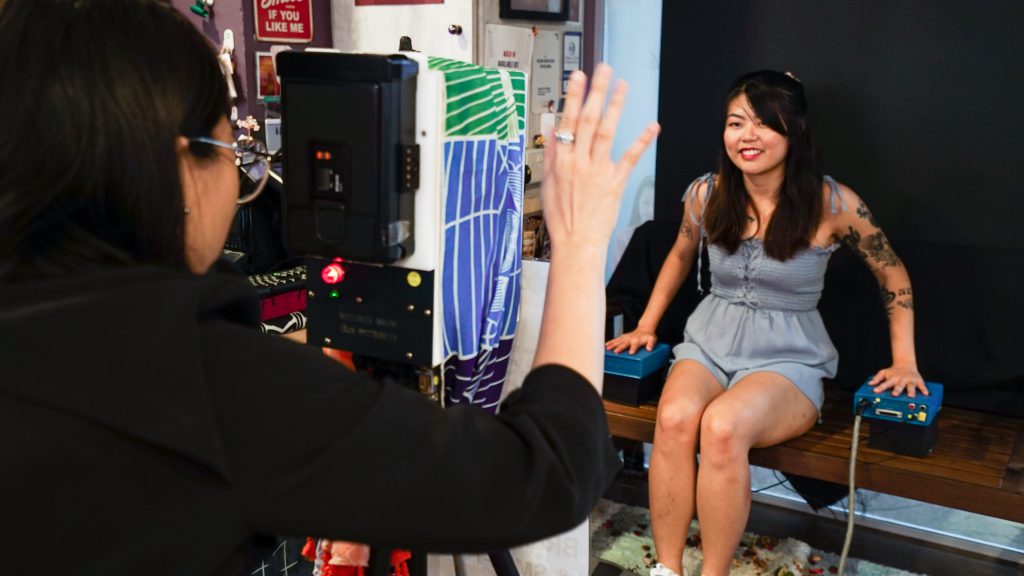
“Okay, now look into the camera, relax and smile!”
I took a deep breath and flashed a smile. I felt like a kid whose portrait was being taken for the school yearbook, excited but also nervous, with no idea what outcome to expect. A few seconds passed before the shutter went off.
A polaroid emerges from the camera and the staff pulls it out as a nearby printer starts to run, printing what looks like an analytical report.
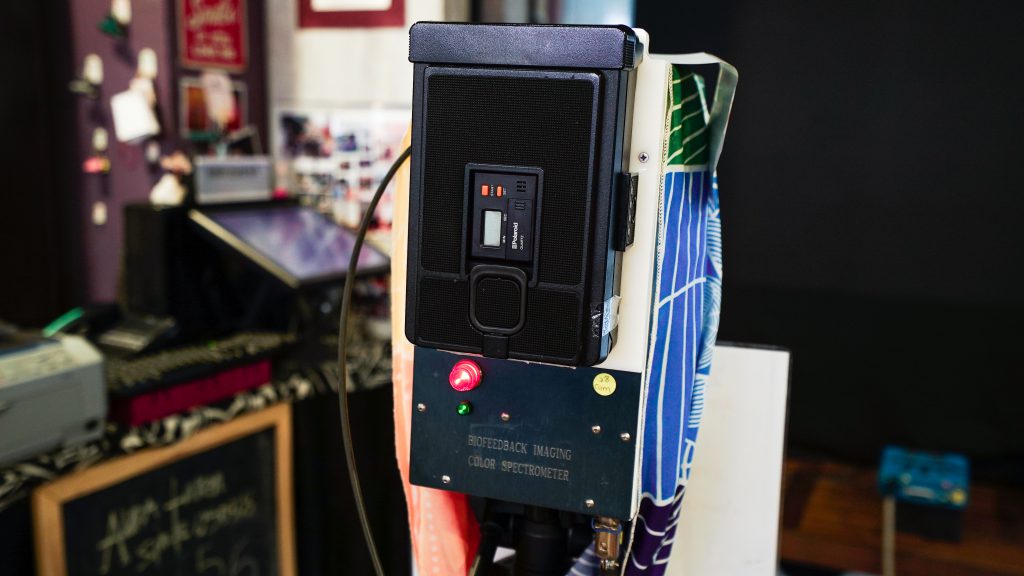
I was then ushered to a more secluded corner of the shop, where Yi Xin greets me with a beaming smile. Unlike what’s portrayed in most films, Yi Xin is not dressed in a long flowy robe with a bandana in her hair and a cat purring on her lap. Instead, she’s got on a dark purple pantsuit, light makeup, and a gemstone pendant hangs from her neck.
At this point in time, I just want to know what my aura portrait means. Is it good? Is it bad? What does it say about me?
Aura Reading
Yi Xin starts off by introducing to me the whole concept behind auras.
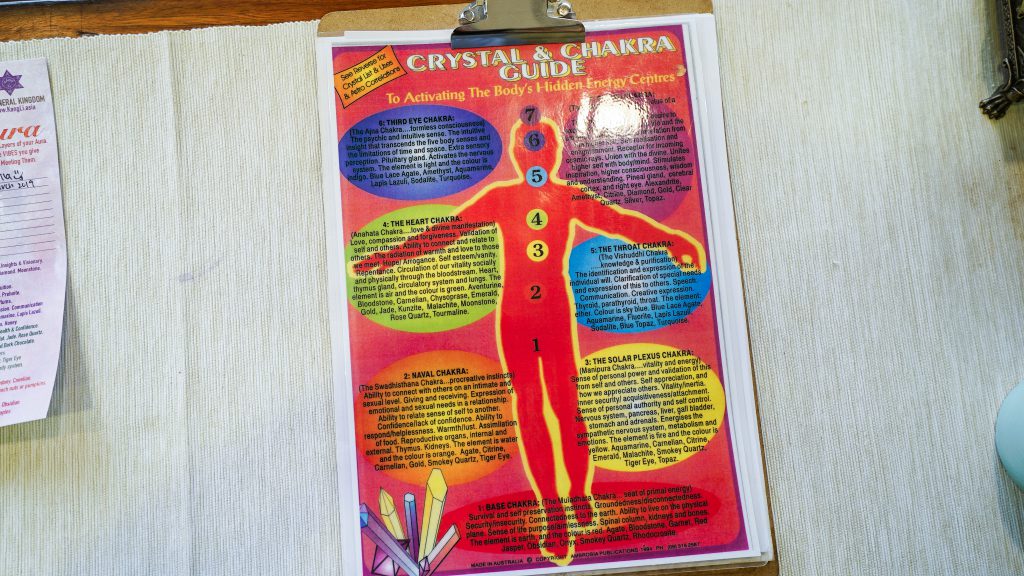
“So basically how the aura forms is that we have these seven chakras that every one of us has. All these points will vibrate and give off energy based on what you think, how you feel and the things that you do. So when they all come together, naturally they’ll form your aura.”
On the left is what you’re attracting in. The right is what your future presents, and the centre is your core.
My aura presently? A bright scarlet red, with a presence of orange at the core. After seeing all the colourful auras that were plastered on the counter before this, I couldn’t help but feel worried, and my defences were up, ready to dispel any misinterpretation that may come my way.
A month back, I’ve gotten my aura photographed for the very first time, and it was a dark brooding red. I showed Yi Xin my previous aura portrait and asked for her views. She placed both polaroids side by side and inspected it for a brief moment before giving me nods of approval.
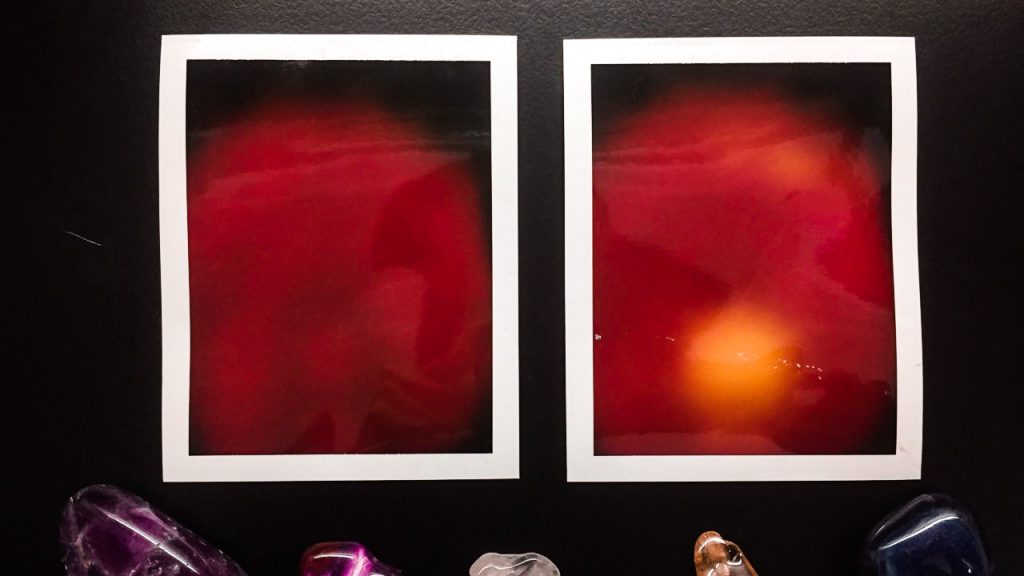
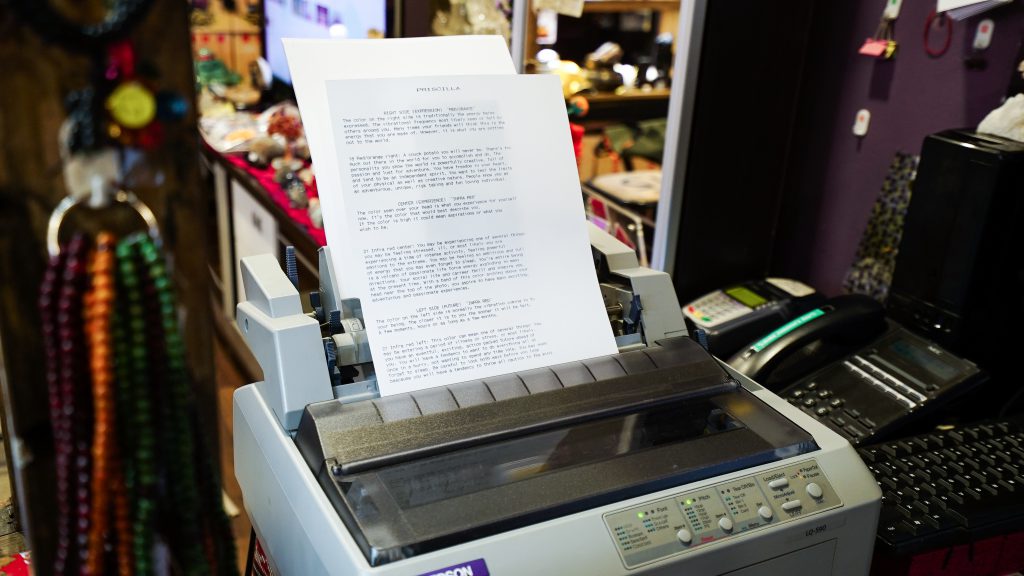
Yi Xin share that I’ve got what she’d refer to as the “warrior aura” and people with such auras have a strong personality and it’s hard to shape someone like us.
“I think all along you are more careful with how you feel and you are more aggressive in the way that you are. The orange at the heart however shows that something lit up in you and you are now happier. Previously you were dealing with some really hard stuff but now you are better. You have dreams you are chasing and you feel joy, although you might still feel stifled sometimes.”
For someone who has only met me for the first time, Yi Xin was surprisingly accurate in reading my personal life. I was in awe, but also bewildered that she was able to deduce that I’ve just came out of a tough period in my life and am now at a much better place.
Any of us in this situation would be.
What Is This Aura You Speak Of?
“Any questions?”
“How were you able to tell all that with just a picture of coloured light? What exactly is aura again? And how did this whole aura thing came about? How does it work?”
Yi Xin laughed and beamed me a smile as she began addressing my doubts.
“Your aura is your energy, how you interact with people, what you put off to people. That's why when you meet certain people you might feel like they’re fierce or aloof, that kind of stuff, it's because of their aura.”
She went on to touch on the origins of aura photography, which was invented by a professor, <a href=" Guy Coggins, who wanted to create a tool to measure the human energy field in real time, and help therapists and healers better understand and aid those in need.
I told her about someone I knew from school who claimed that they could see people’s aura with their own eyes and asked her if that’s possible.
“Actually, I personally believe that it’s tough for one to be able to see auras, especially in Singapore.”
Yi Xin suggest that though it’s not impossible, it’s harder for it to be credible. Even she herself can’t see auras. After all, the auras “photographed” are actually credited to the biofeedback hand sensor and the aura machine.
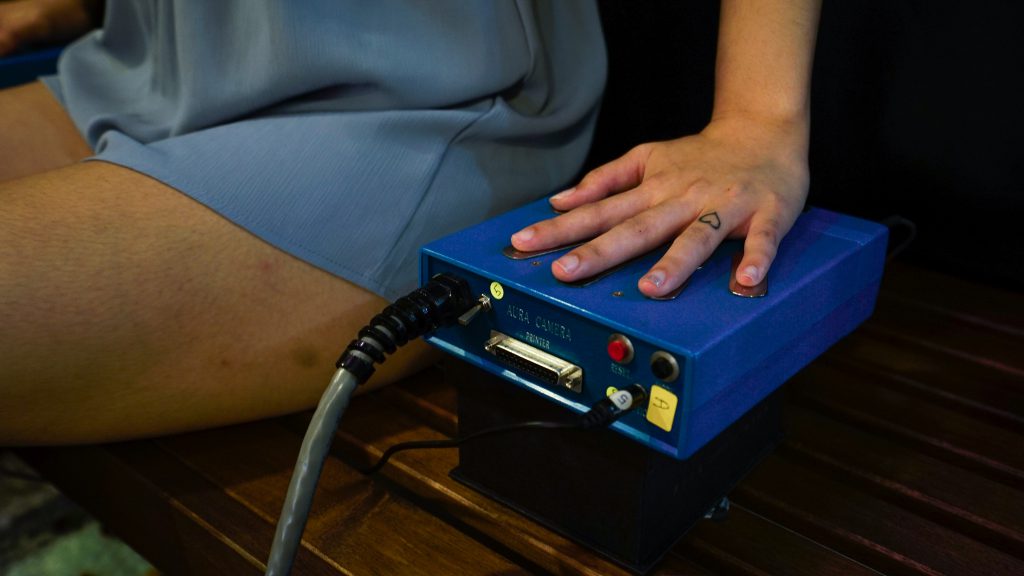
The hand sensor itself has various contact points on them which are connected with certain organs of the body. This allows the machines to measure the electromagnetic field of the user and in turn deliver information about the energetic and auric qualities of that person.
The data is then projected as a radiant coloured glow on the polaroid.
“On the other hand, there are also [commercialised] aura readings
nowadays, where they just want to sell you a product. There are even apps that allow you to get your aura read with just a picture.”
Yi Xin feels that such apps only defeats the purpose as it’s not the most authentic experience, nor will it be as in depth and personalised, thus unable to provide that sense of clarity that most people come to seek for.
The Heiress of A Spiritual Shop
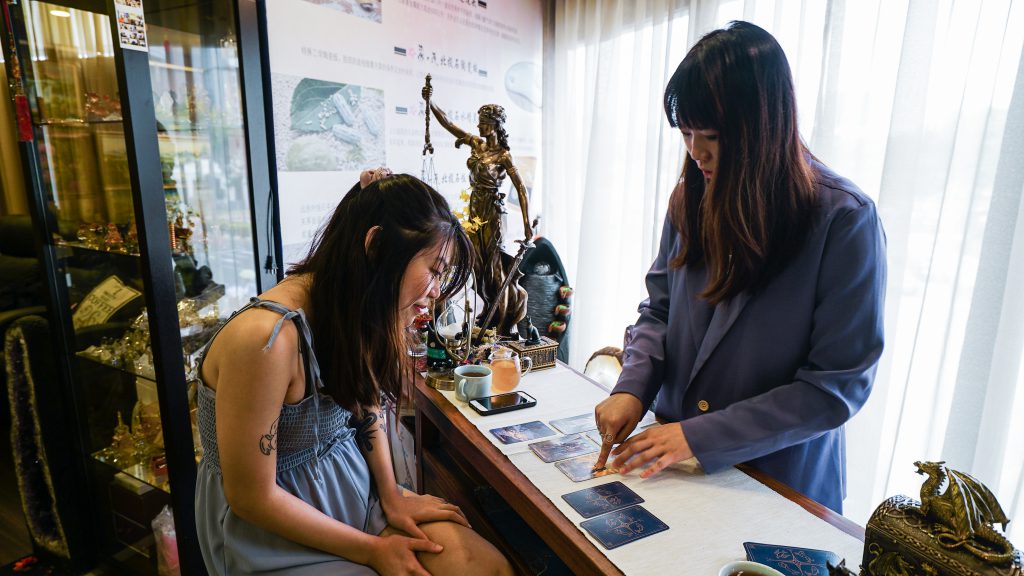
As the daughter of the owners of Kang Li Mineral Kingdom, Yi Xin has been surrounded by spirituality since young. Besides aura photography, their shop also does tarot card reading, crystal healing spa, geomancy and feng shui, to name a few.
Thus, it doesn’t come as a surprise that at just age 17, Yi Xin has already started to dabble in aura reading, tarot card, feng shui and crystal healing, among others.
“Back then, there wasn’t anyone who could teach you such skills, and even if there are, they don't know how to begin teaching as well, so I started learning and reading the basics by myself.”
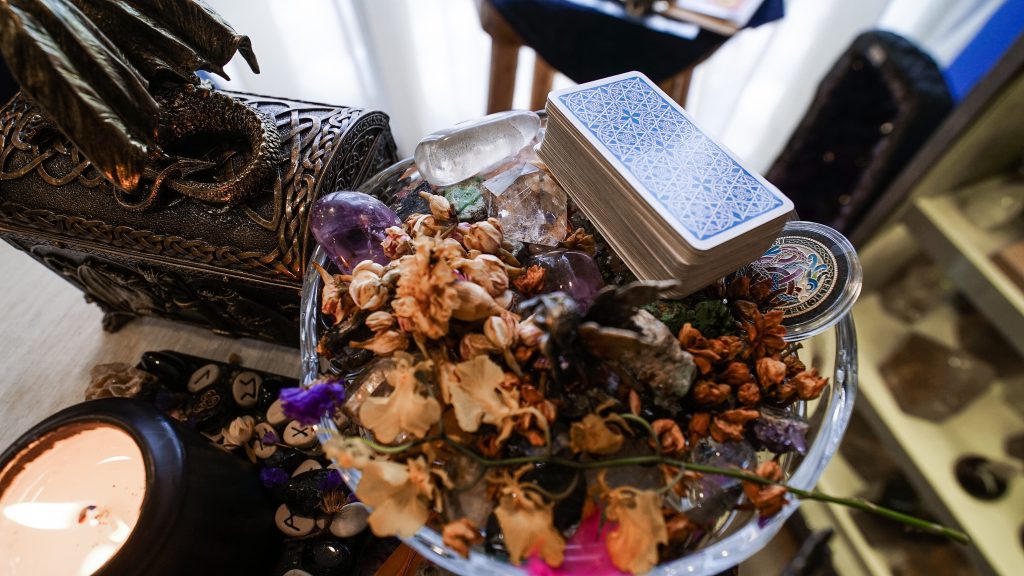
“At first, I thought it was just explaining to people the meaning of the items so I was very [technical] with my readings. But as I grew older and talked to more people, I realised that I needed to meet and observe people of all walks of life to truly be able to identify the different kinds of auras and understand people better. Only then will I be able to know how to help different kinds of people better.”
In her quest to become a better spiritual practitioner, Yi Xin also keeps a diary of her aura reading sessions, where she notes down her own analysis of each customer she served, describing how she felt the person’s mind was, how their “heart” is like, and how their energy felt like to her.
Besides that, she and the other staff in the shop also do aura checks regularly to better understand their own energy and state of mind.
“That's why some people might ask why the report and what I share is different. The report is more general. It gives only the 'first layer', while my reading is based on my interpretation of you as well, and is more [personalised].”
“What Do You Even Know?”
As with everything, there are a lot of people who are skeptical about spirituality in general. Yi Xin is fine with that, but then, there are people who are just downright disrespectful.
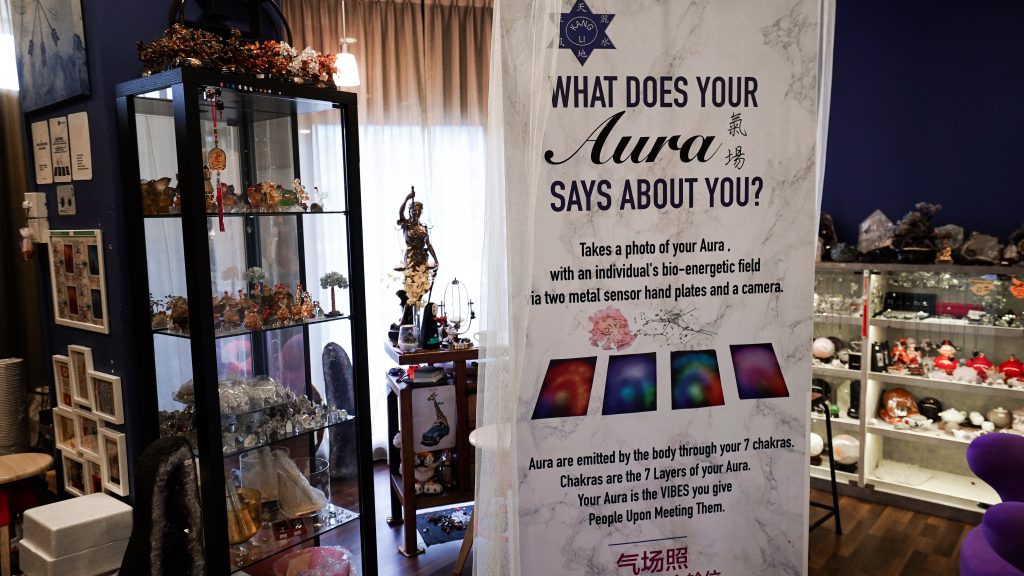
“I’ve had cases where people would come in here and try to taunt me with comments like 'what do you even know about auras, you’re too young' or even challenge me by doing their own reading with their own customers in our shop. Some even come into the shop just to mess with the items.” she sighed as she recounts some of the less-than-pleasant encounters that she has had.
These has often caused Yi Xin to feel dejected, especially so at the earlier stages of her career. But as the years went by, she has come to realise that no matter what she does, there will always be people who don't believe in what she does.
“It used to affect me a lot because it feels like they didn’t even give me a chance in the first place. They come with the mindset that they don't believe and won't believe, and nothing will change if they've already set on the verdict beforehand. That’s why now I prefer to only read for those who genuinely need some sort of clarity and is willing to give it a chance.”
The Light In All Things
But that’s something she’s willing to accept, as long as she gets to continue helping people out there.
“Personally, what I want to do is just help people. People who feel like they’ve lost their hope, is lost in life, can’t properly see a situation or a way out of their problem. As a spiritual practitioner, I believe my purpose is to give people peace of mind and help them gain some sort of introspection.”
However, It’s only recently that Yi Xin saw the light in her career.
“What changed was that I actually met someone who closed himself off from his family for weeks because he wanted to commit suicide. But through the spiritual reading, he opened up and was able to gain another perspective of the problems he was facing.”
It is also because of cases like these that initially motivated her to make the switch from film (which she studied) to this line of work—it is more meaningful and fulfilling.
Some Things Just Are
Be it aura reading, horoscopes, or tarot card reading, the spiritual is always intangible and up to one’s interpretation and discernment.
If a session of aura reading can provide solace to someone who felt like they’ve lost all hope, who are we to determine whether it’s right or wrong? After all, it’s human nature for us to yearn for something to believe in, something that will get us through the toughest of times and provide us with the reassurance of better days ahead.
Whether we choose to believe it or not, it’s undeniable that spiritual readings are indeed beneficial to some.
Perhaps we’ve been asking the wrong questions all along. Instead of being fixated on the whole “is this real” debate, what we should have been asking is “why?”.
Despite all the skepticism, Yi Xin has accepted that hers is not a path that is recognised by most people. It doesn't matter either because it is not for her to decide what other people speak of her.
Ultimately, her biggest wish is for those who visit her shop for spiritual readings to leave the place with a new found sense of clarity to take on the world with zest once more. And if she can be that person to enable her customers or make them that little bit happier, it's enough.
Also read: Legit Or Not? A Sceptical Millennial Tries Hypnotherapy By A Professional In Singapore
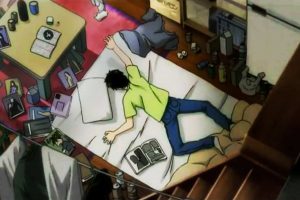 Image Credit: <a href="
Image Credit: <a href="
WHAT'S HIKIKOMORI?
For the uninitiated, hikikomori is a term used to describe those who rarely leave their house, and seek extreme degrees of isolation. Some never set foot outside their homes. Others occasionally do, heading out to buy food or even to the cinemas for the latest blockbuster, but all of them are completely, socially isolated. They would even limit their interaction with their own family members. Although this social phenomenon is predominantly widespread in Japan, I recently stumbled upon a Reddit thread that tells me that we too, have our share of social recluses hidden in their rooms somewhere, unseen by society. Through a local forum, I stumbled upon Andrea’s story. Back then, Andrea cooped herself up at home for eight consecutive months. Waking up at five every morning, she spends her time browsing Reddit, reading and binging on TV series, only leaving her room for lunch and dinner, which her parents would prepare for her. At around 11 pm, she will head to bed and the same routine repeats for months, and in those months, she did not step out of her house once.Her home had become a place of solace for her, a fortress she can’t bear to leave.Likewise, this is the case for the many hikikomori in Singapore, who have taken to forums to pour the feelings that they have hidden away from their friends and family.
WHY DO THEY ADOPT THE HIKIKOMORI LIFESTYLE?
Hailing from a ‘financially comfortable’ background, Andrea is aware that she is more fortunate than most, as she could afford the option of not having to work or fend for herself. But because of that, she feels more pressured to pay her parents back for all that they have done for her. The low self-esteem, crippling social anxiety, and negative outlook on life that came from her being bullied in school when she was younger kept her imprisoned. The self-imposed pressure and the expectations about the future stressed her out and caused her to feel even more helpless. When she finally entered the workforce, work became her life. All she did was wake up, go to work, head home to have dinner with her parents, and repeat. Due to her micromanaging boss, she grew to resent work. Even so, she continued working for some years to save up a sum of money before eventually resigning, dampened by the rat race. “So after that, I didn’t really have a plan. I just stayed home. Months quickly turned into years. And because I was used to a solitary lifestyle of just reading and watching drama and anime, I just shut myself off from society and basically became hikikomori, just living off my parents and my savings.”ONLY FOR THE PRIVILEGED?
Of course, not everyone is privileged enough to be able to just drop everything and withdraw from society in the first place — most of us are not as financially blessed. Through r/hikikomori, I was able to speak to another Singaporean hikikomori, 24-year-old Josh*, who shared how he was once a hikikomori. Like Andrea, Josh comes from a financially stable family.“Maybe we were too sheltered. Maybe we were too spoiled and everything comes to us easy and without any barriers. Back then, I felt that no matter how useless I was, I would still be able to live comfortably, or still be able to live somehow.”An avid fan of Disney’s classics, Josh had a grandiose dream of being a 2D Animator for Disney. When news broke that Disney closed down their 2D animation company, his hopes and dreams were dashed. Dejected, he let himself waste away, passing the days by gaming and watching anime at home.
WHAT'S THE CAUSE FOR THIS?
For many of us, such behaviour is aberrant and tough to comprehend, much less empathise with. It’s not surprising for us to jump on the conclusion that hikikomori chose to stay cooped up at home because they are just “lazy” and “spoiled”. “We all have problems, so why can’t they just do something about their problems?” But unlike what we think, the hikikomori syndrome is not another convenient excuse to be idle.In fact, most, if not all, hikikomori hate the plight that they put themselves in, and they are ashamed of it.“When I was hikikomori, I lost all desire for wants. Normal things like going to movies or buying expensive new things don’t interest me anymore. I don’t know why I exist, to be honest. Sometimes I can feel my parents’ disappointment in me and I don’t feel good too,” shares Andrea. They have confined themselves to their homes, but most hikikomori actually want to return to society. However, the fear and anxiety of how society may react to them. Even if they manage to take the first step out of their homes, they are plagued by this constant fear that they are being judged by those around them, afraid that the world wouldn’t come to accept them because of their past. Maika Elan, a Photographer exploring the topic of hikikomori, shared on National Geographic that “Over time, hikikomori lose whatever self-esteem and confidence they had, and the prospect of leaving home becomes ever more terrifying. Locking themselves in their room makes them feel ‘safe’.” Similarly, Andrea admitted that the very paranoia of being judged for being a hikikomori is the toughest obstacle she had to overcome. She would often slip back into isolation because of it. Thanks to volunteer work at a church, Andrea was able to break out of the hikikomori syndrome. She eventually managed to land herself a job through one of the other volunteers. As for Josh, he stumbled upon the animes Re:Zero and Konosuba, which shifted his perspective on life. Both shows feature male protagonists who were hikikomori and Josh was able to relate to them strongly. “In Re:Zero, it tells us that no matter where you are, nothing’s going to change if you don’t put in any effort to take charge and improve yourself.” Witnessing his friends’ success also pushed him to eventually change his lifestyle.
“What gives them the drive to keep doing what they do? Why are they set on improving themselves and going out there to find jobs and socialise, and to be proactive with their lives?”These were the questions that Josh posed to himself, and subsequently embarked on a quest to uncover. “Sometimes it’s hard, but you just have to remember that there are other people out there who are struggling and still trying their best as well.” Today, he works as a Digital Designer, which is not too far off from his initial dream. Although, there are others who struggle to break out. “It all started after he finished his degree overseas and came back. He didn’t find work and just stayed at home gaming and surfing the net. We’d ask him to come out for coffee or meals but he’d always turn us down.” Tim*, a male in his 30s, shares with me about his friend who has been a hikikomori for over 10 years. “I’ve a feeling that the shame of being long unemployed while everyone else is working just drives him to become a hikikomori. I guess his parents still buy him food or give him spending money so he doesn’t need to force himself to get a job.”
A VICIOUS CYCLE OF FEAR AND PARANOIA
Although hikikomori is a social condition that has not been widely recognised as a mental illness, many of them do require mental health care. Some turn to this reclusive lifestyle due to a lack of purpose or existential crisis while others do so as a form of rebellion to cope with trauma such as childhood abuse or bullying. While hikikomori wish to recover, they are so ashamed of their past that it freezes them up, causing them to retreat back into their shelter. However, the longer they isolate themselves from society, the harder it will be to integrate back into it. It’s a vicious cycle that they are dealing with. For such people who haven’t interacted with anyone nor formed any ‘proper’ relationships, it could be tougher for them to reintegrate into society as they grow older, especially if their family members (like their parents) are no longer around to support them. In Japan, this has become a real problem. These days, it’s an absolute nightmare if we were to be void of our handphones, computers, and the internet. While technology is not the root cause of the hikikomori syndrome, it provides a gateway to endless virtual worlds that we can immerse ourselves in. Nat*, another Redditor, says he usually spends an average of 10 hours on his computer and does not see the need to leave his home. Whether it’s food or entertainment, technology has made that conveniently accessible and available for us. There are even avenues to learn and work ‘virtually’, with online classes and freelance jobs. All of these make it even easier for one to slip into the hikikomori lifestyle. With that said, however, completely isolating oneself from society is not healthy, and should not be normalised. Regardless, Josh hopes that hikikomori will have it in them to realise that they are responsible for themselves, and find the strength in them to overcome it, just like he did.“There’s only so much that others can help you with. Only you can change yourself. Even if it’s for your parents or yourself, I hope you will find it in you to want to get better.”“We all are living for a reason. We need to reflect on that more often, to put our lives into perspective. Once things are in perspective, it will all make sense in the end.” “After all, life exists and thrives beyond these four walls, but it’s up to us whether or not we want to open the door to live.” *Names have been changed to protect the identity of the individuals. Also read: It’s The 21st Century, Why Do We Still Treat Maids Like Slaves? (Header Image Credit: Unsplash)
1. Not having enough money
My greatest fear is not having enough money to support myself. Without money, I wouldn’t be able to afford basic necessities like food and water. Even public transport will be inaccessible for me. Plus, I don’t like to rely on other people. If I have no money, I’ll have to go around borrowing money from others and I personally hate doing so. - Melissa, 272. Not living up to expectations
Since young, many people have told me that they see a lot of potential in me. Be it doctor, lawyer, or a successful businessman, they are convinced that I’m going to do great things. Because of that, I’m always fearful that I’m not going to reach that level of potential that they’ve set out for me. Thus, I always push myself to work hard everyday so that I’ll be able to match up to their expectations of me. - Daniel, 263. Settling for an unfulfilled life
In Singapore, a lot of emphasis is placed on financial success. My parents want me to have a corporate job so that I’ll be financially stable, but that’s not where my passion lies. So I made a promise to myself to ‘sell out’ and settle for something else instead of chasing after my passion. - Edirina, 204. Losing my loved ones
As a mother of two, family means a great deal to me. I had my first child when I was just 19 and it has taught me so much about love, patience, family and compromise. I’m really grateful for my parents, my husband, and my two little girls. I can’t imagine life without any of my loved ones. - Esther, 265. Getting kicked out of home for coming out
As with most asian families, my mom is conservative and fierce (aka tiger mom). As much as I love her and am thankful for her bringing me up all these years, I’m afraid of coming out to my family as I don’t want to risk getting kicked out. I’m not sure that their love for me will be able to overpower the disdain they have towards more liberal ideas. - Scott, 256. Self-imposed Inadequacy
My parents are super chill and they let me do whatever I deem fit. Because of that, I’ve always had really high expectations of myself as I feel that if I don’t take control of my own life, no one will. Further fueled by my own insecurities, the thought of being inadequate in any sense, be it at work or life in general, just doesn’t sit well with me. - Zul, 247. Being judged
Back in primary school, I was always afraid of getting called to answer a question in class as I was afraid that if I get the answer wrong, people would laugh at me and make nasty comments about me behind my back. I would get anxious easily and sometimes, that stops me from doing the things that I like. Because of my anxiety, I would always be afraid that people are judging me, even if they aren’t. - Anna, 258. Not going to heaven
Whether you’re religious or not, I’m pretty sure that you know what Hell is about: basically, a lifetime of torture. I wouldn’t want to end up going to Hell because I don’t want to suffer and be tortured for the rest of my life. I can’t even handle life, how am I supposed to handle Hell?! In my religion, we believe that Heaven is a really great place to be at. So I want to end up there when I die and just enjoy. - Matthew, 219. Losing my arms
I’m a designer and an avid gymmer so my physical body parts mean alot to me. Thus, I would say that my greatest fear is losing my arms as that will mean that I can’t do the things that I like anymore. I can’t imagine living life without designing, drawing, painting, and weightlifting. - Jan, 2610. Death
I fear death as it means that the whole world will continue to go on without me after I’ve passed and I’ll be non-existent and slowly forgotten. I also fear the unknown. None of us truly knows what is going to happen after we’re dead, and that scares me. - Shi Ling, 2711. Dying alone
I’m a romantic. I believe in ‘The One’ and I yearn to meet someone whom I’m able to connect with on all wavelengths. So I’d say my greatest fear is not being able to find someone that can stimulate me both intellectually and emotionally and I’ll die alone, with nobody to love and no one to love me back. - Mabel, 2212. Never being able to love myself
As a child, I was overweight and ugly. I would get picked on by my peers and my parents would make insensitive comments about my appearance. I wasn’t taught how to love myself and I grew to be my own worst critic. Till now, I struggle with low self-love and I can’t seem to be comfortable in my own skin. I guess my greatest fear would be that I will never be able to learn to love myself for who I am till the day I die. - Alethea, 2113. Losing control of myself
Not having control over my own life and decisions, be it consciously or physically. Maybe I’ve been watching too much ‘Black Mirror’ but I imagine not being able to control my own thoughts or actions and that’s so scary! - Alanna, 2214. Being the same as everyone else
As I grew up in a family where sibling rivalry is ever present, I always pride myself in being different from my sister so that my parents wouldn’t compare us as much. I think that led me to always strive to be different from everyone else. - Melodie, 2015. Not being able to make it
It’s very competitive in the Arts industry so I’m always pushing myself to learn more and create things that are fresh and unique. I really want to be an Artist and I can’t foresee myself doing anything else, so my greatest fear would be not succeeding in the field that I’m passionate about. - Karen, 20Not Just Young And Nonchalent
After speaking with these millennials, I realised that many of us have very practical concerns. Most of us just tend to keep our concerns to ourselves as we’re afraid that our worries will be deemed insignificant because of our young age. But that shouldn’t matter. Be it age 18 or 35, we’ve all got our own set of worries and problems that we have to deal with. We might be young and throwing around phrases like YOLO and ‘live fast, die young’ but our worries don’t just consist the common irrational fears and superficial wants, many of them stemmed from our upbringing and culture. So here’s the age-old question I’m throwing back at you, what’s your greatest fear and how do you deal with it? Share with us in the comments below! Also read, 8 Singaporeans Shared Snapshots Of What Depression Was Like For Them.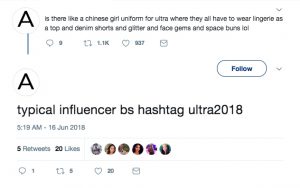 Now, before any of you decide to call me out for it, let it be known that I’m guilty of wearing the aforementioned “Chinese girl uniform”.
She’s not wrong, this formula seems to be copied and pasted onto the other thousands of people at Ultra, making my life a rerun of Fashion Police episodes where my friends would poke fun at me by constantly asking “who wore it better?” whenever they spotted other girls wearing the same outfit as me: a $15 black lace bralette top from TEMT.
Weirdly enough, even after all my run-ins with my fashion clones, never once have I shared A’s stance on the girls’ fashion at Ultra. In fact, her statement brings to light an even greater issue that precedes poor fashion choices: an epidemic that is girl-on-girl hate.
A manifestation of internalised misogyny, girl-on-girl hate is prevalent in most of our daily lives. Whether we're aware of it, it’s present in the way we dole out snarky remarks about other women’s behaviour or dressing and comment things like “I’m not like other girls”, or “girls are so dramatic, I prefer hanging out with guys,” mostly to receive validation from or fit in with men.
A relevant example would be the fairly recent sex tapes leak of a few local influencers. A trending topic among Singaporeans, males and females alike, people were bursting at the seams with unfounded criticism.
What shocked me the most was when a female friend of mine commented that the victim of the leaked private tapes is a “stupid slut” for filming a personal video with her long-time partner whom she’s in a committed relationship with. Not only that, she prides on coming up with countless derogatory comments aimed at influencers who are empowered by a more risqué dressing style.
Similarly, I can’t help but see A’s comments on the girls’ outfits at Ultra as seemingly laced with internalised misogyny.
It’s important to note that us girls aren’t the only ones who had a template like dress code at the festival. The guys present had on a “uniform” too: beach shorts paired with muscle tanks and/or tropical button up shirts, although most would end up shirtless by the end of a set anyway.
Now, before any of you decide to call me out for it, let it be known that I’m guilty of wearing the aforementioned “Chinese girl uniform”.
She’s not wrong, this formula seems to be copied and pasted onto the other thousands of people at Ultra, making my life a rerun of Fashion Police episodes where my friends would poke fun at me by constantly asking “who wore it better?” whenever they spotted other girls wearing the same outfit as me: a $15 black lace bralette top from TEMT.
Weirdly enough, even after all my run-ins with my fashion clones, never once have I shared A’s stance on the girls’ fashion at Ultra. In fact, her statement brings to light an even greater issue that precedes poor fashion choices: an epidemic that is girl-on-girl hate.
A manifestation of internalised misogyny, girl-on-girl hate is prevalent in most of our daily lives. Whether we're aware of it, it’s present in the way we dole out snarky remarks about other women’s behaviour or dressing and comment things like “I’m not like other girls”, or “girls are so dramatic, I prefer hanging out with guys,” mostly to receive validation from or fit in with men.
A relevant example would be the fairly recent sex tapes leak of a few local influencers. A trending topic among Singaporeans, males and females alike, people were bursting at the seams with unfounded criticism.
What shocked me the most was when a female friend of mine commented that the victim of the leaked private tapes is a “stupid slut” for filming a personal video with her long-time partner whom she’s in a committed relationship with. Not only that, she prides on coming up with countless derogatory comments aimed at influencers who are empowered by a more risqué dressing style.
Similarly, I can’t help but see A’s comments on the girls’ outfits at Ultra as seemingly laced with internalised misogyny.
It’s important to note that us girls aren’t the only ones who had a template like dress code at the festival. The guys present had on a “uniform” too: beach shorts paired with muscle tanks and/or tropical button up shirts, although most would end up shirtless by the end of a set anyway.
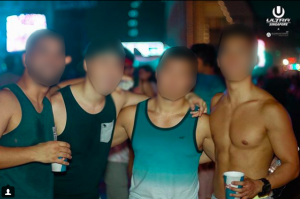 Yet us girls were the ones mainly subjected to the criticism, and therein lies the problem.
Should Twitter user A’s main concern be based solely on the fashion choices made at Ultra, my reply to that is simple: it’s a music festival, chill out.
First and foremost, It’s safe to say that everyone’s main objective for the 2-day event is to enjoy the music and have a good time. It doesn’t matter what we’re wearing as long as it’s comfortable and able to withstand the nine hours of heat, sweat, bustle, and the inescapable body contact with the crowd. For some, a comfortable party outfit could be a unicorn onesie (you do you!), but for others, lingerie and crop tops fit the bill.
Unlike the usual happy hour and ladies night at Clarke Quay, Ultra or any other music festivals, for instance, is not an everyday occurrence. Undoubtedly, many of us revel in the hours spent prepping ourselves up for the occasion. As with all night outs, we want to look alluring and feel confident. Some do so with minimal clothing while some dress up to the nines. It’s a once in a year (or lifetime for some) event and we shouldn’t bash someone up for the outfits that they wear, or the lack of it.
No matter how hard I try, I just can’t seem to understand why people are being so uptight over one’s outfit of choice at Ultra. Personally, I’m of the viewpoint that the “Chinese girl uniform” I wore to Ultra can easily be worn at Good Vibes Festival or even ZoukOut. Simply because it’s something I feel comfortable and confident in. Even Ultra Singapore First Timer's Guide urges us to simply wear "comfortable clothing and shoes", so unless there’s a specific dress code for each music festival, I don’t get why we can’t dress however we want.
Bottom line is we’re here to party, not to be critiqued for what we decide to wear to a music festival. Sure, some of us might dress like your typical influencers in our bikini tops and summer shorts or even #doitforthegram but why are we nitpicking over such minute details?
As long as our outfits aren’t culturally offensive (read: Native American headdress, bindi, cornrows etc), then it shouldn’t matter that we’re clones of one another in our glitter-coated bodies and double xiao long bao hair. Life’s too short to dwell on such inconsequential things.
At the end of the day, music festivals are meant for us to rave and have a good time, so let’s do just that.
Also read, This Is Why Wearing Heels Is Empowering And F*cking Sexy.
Yet us girls were the ones mainly subjected to the criticism, and therein lies the problem.
Should Twitter user A’s main concern be based solely on the fashion choices made at Ultra, my reply to that is simple: it’s a music festival, chill out.
First and foremost, It’s safe to say that everyone’s main objective for the 2-day event is to enjoy the music and have a good time. It doesn’t matter what we’re wearing as long as it’s comfortable and able to withstand the nine hours of heat, sweat, bustle, and the inescapable body contact with the crowd. For some, a comfortable party outfit could be a unicorn onesie (you do you!), but for others, lingerie and crop tops fit the bill.
Unlike the usual happy hour and ladies night at Clarke Quay, Ultra or any other music festivals, for instance, is not an everyday occurrence. Undoubtedly, many of us revel in the hours spent prepping ourselves up for the occasion. As with all night outs, we want to look alluring and feel confident. Some do so with minimal clothing while some dress up to the nines. It’s a once in a year (or lifetime for some) event and we shouldn’t bash someone up for the outfits that they wear, or the lack of it.
No matter how hard I try, I just can’t seem to understand why people are being so uptight over one’s outfit of choice at Ultra. Personally, I’m of the viewpoint that the “Chinese girl uniform” I wore to Ultra can easily be worn at Good Vibes Festival or even ZoukOut. Simply because it’s something I feel comfortable and confident in. Even Ultra Singapore First Timer's Guide urges us to simply wear "comfortable clothing and shoes", so unless there’s a specific dress code for each music festival, I don’t get why we can’t dress however we want.
Bottom line is we’re here to party, not to be critiqued for what we decide to wear to a music festival. Sure, some of us might dress like your typical influencers in our bikini tops and summer shorts or even #doitforthegram but why are we nitpicking over such minute details?
As long as our outfits aren’t culturally offensive (read: Native American headdress, bindi, cornrows etc), then it shouldn’t matter that we’re clones of one another in our glitter-coated bodies and double xiao long bao hair. Life’s too short to dwell on such inconsequential things.
At the end of the day, music festivals are meant for us to rave and have a good time, so let’s do just that.
Also read, This Is Why Wearing Heels Is Empowering And F*cking Sexy.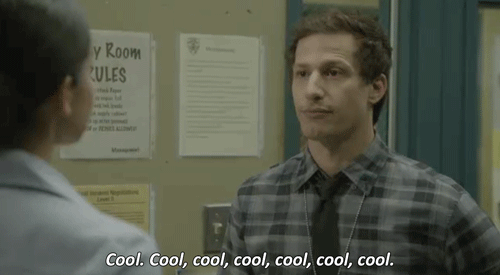 The same goes for K-Pop fans, film geeks, fitness enthusiasts and so forth.
After all, parts of our identity can be ascribed to our environment and the content we consume. No one’s identity is free from influence or cultivation. Our environment, upbringing, beliefs and experiences all play a part in creating our identity.
Once upon a time, my friends and I taped up our webcams as a precautionary measure after watching an episode of Black Mirror where the lead character was blackmailed with footage that was obtained after his webcam got hacked. Turns out, almost everyone who watched that episode did the exact same thing.
The fact is you’re not going to be the only one who feels, think or act a certain way.
Even so, we try excruciatingly hard to be unique. We’d willingly trade our $1.60 Kopi bing for $6 Iced Coconut Latte (read: hipsters) and ditch our mama shop flip-flops for Gucci sliders (read: hypebeasts) because we’d much rather disappear off the face of the earth than to be seen as an average individual. Hell, we’d even force-feed ourselves the lovechild of McMuffin and Hotcakes just to ride on the McGriddles hype train and be seen as a #foodie.
I once knew someone, let’s call him Ben, who embodied the average joe stereotype with his H&M clothes, Kopitiam card and his overplayed Top 30 radio hits playlist. Ben was fine with that, that is until the girl he’s interested in commented that he’s too “basic” for her liking. Hurt, he did a 180 and began to splurge on the latest clothes and sneakers and he replaced his mainstream playlist with hip-hop, trance, and underground R&B tunes. Now, his former average joe self-seems like a distant memory, but I can’t help but think that in a way, he fell victim to society’s idealistic belief of us having to be a special individual to make the most out of life.
As much as we’d want to be seen as an original, there’s a fine line between rebelling against the masses for what you stand for and deviating from the norm just because you want to be different from the rest. It’s important that we do not do the latter and end up like another Ben.
It is also unrealistic for us to aspire to be known as the only Priscilla aka Pop Punk Girl With Unorthodox Views or the only Marc aka The Musically Inclined Athlete because there’s bound to be someone out there who’s an exact copy of you. Even our names, an integral part of our identity, are shared with strangers all over the world.
To call yourself a 100% unique individual would be trying to convince yourself that the moon is really following you. So, don’t exhaust yourself in a bid to be known as an original. If you don’t feel the need to replace your entire wardrobe every new year or if you love your mainstream Top 30 songs because that’s just how you roll, then so be it.
It’s your life and you should own it, regardless of what society expects of you.
Also read, The Ugly Truth: Not Everyone Is Beautiful.
The same goes for K-Pop fans, film geeks, fitness enthusiasts and so forth.
After all, parts of our identity can be ascribed to our environment and the content we consume. No one’s identity is free from influence or cultivation. Our environment, upbringing, beliefs and experiences all play a part in creating our identity.
Once upon a time, my friends and I taped up our webcams as a precautionary measure after watching an episode of Black Mirror where the lead character was blackmailed with footage that was obtained after his webcam got hacked. Turns out, almost everyone who watched that episode did the exact same thing.
The fact is you’re not going to be the only one who feels, think or act a certain way.
Even so, we try excruciatingly hard to be unique. We’d willingly trade our $1.60 Kopi bing for $6 Iced Coconut Latte (read: hipsters) and ditch our mama shop flip-flops for Gucci sliders (read: hypebeasts) because we’d much rather disappear off the face of the earth than to be seen as an average individual. Hell, we’d even force-feed ourselves the lovechild of McMuffin and Hotcakes just to ride on the McGriddles hype train and be seen as a #foodie.
I once knew someone, let’s call him Ben, who embodied the average joe stereotype with his H&M clothes, Kopitiam card and his overplayed Top 30 radio hits playlist. Ben was fine with that, that is until the girl he’s interested in commented that he’s too “basic” for her liking. Hurt, he did a 180 and began to splurge on the latest clothes and sneakers and he replaced his mainstream playlist with hip-hop, trance, and underground R&B tunes. Now, his former average joe self-seems like a distant memory, but I can’t help but think that in a way, he fell victim to society’s idealistic belief of us having to be a special individual to make the most out of life.
As much as we’d want to be seen as an original, there’s a fine line between rebelling against the masses for what you stand for and deviating from the norm just because you want to be different from the rest. It’s important that we do not do the latter and end up like another Ben.
It is also unrealistic for us to aspire to be known as the only Priscilla aka Pop Punk Girl With Unorthodox Views or the only Marc aka The Musically Inclined Athlete because there’s bound to be someone out there who’s an exact copy of you. Even our names, an integral part of our identity, are shared with strangers all over the world.
To call yourself a 100% unique individual would be trying to convince yourself that the moon is really following you. So, don’t exhaust yourself in a bid to be known as an original. If you don’t feel the need to replace your entire wardrobe every new year or if you love your mainstream Top 30 songs because that’s just how you roll, then so be it.
It’s your life and you should own it, regardless of what society expects of you.
Also read, The Ugly Truth: Not Everyone Is Beautiful.